八年级英语下册 Unit 1 What’s the matter?Section A(1a-2d)课件(59张PPT)
文档属性
| 名称 | 八年级英语下册 Unit 1 What’s the matter?Section A(1a-2d)课件(59张PPT) | 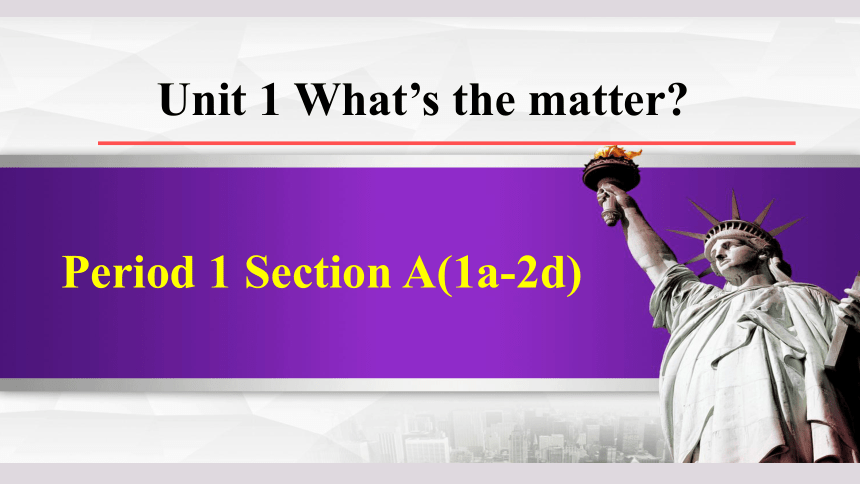 | |
| 格式 | pptx | ||
| 文件大小 | 24.4MB | ||
| 资源类型 | 教案 | ||
| 版本资源 | 人教新目标(Go for it)版 | ||
| 科目 | 英语 | ||
| 更新时间 | 2025-02-06 10:06:43 | ||
图片预览

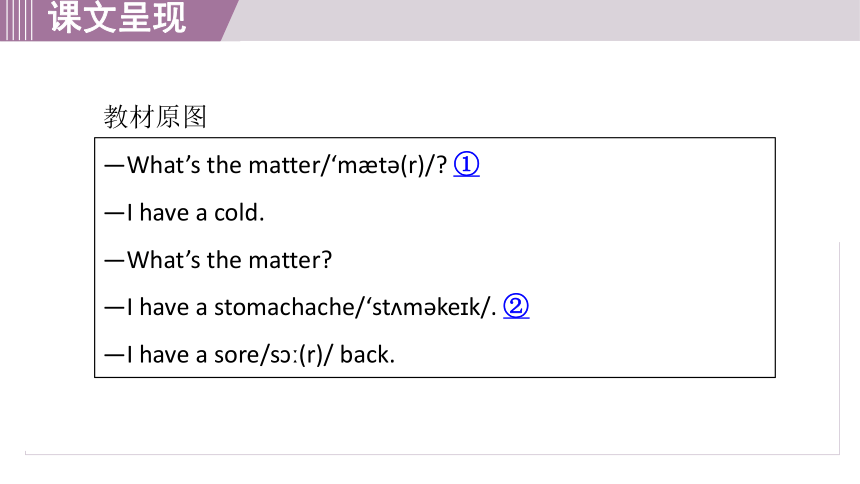

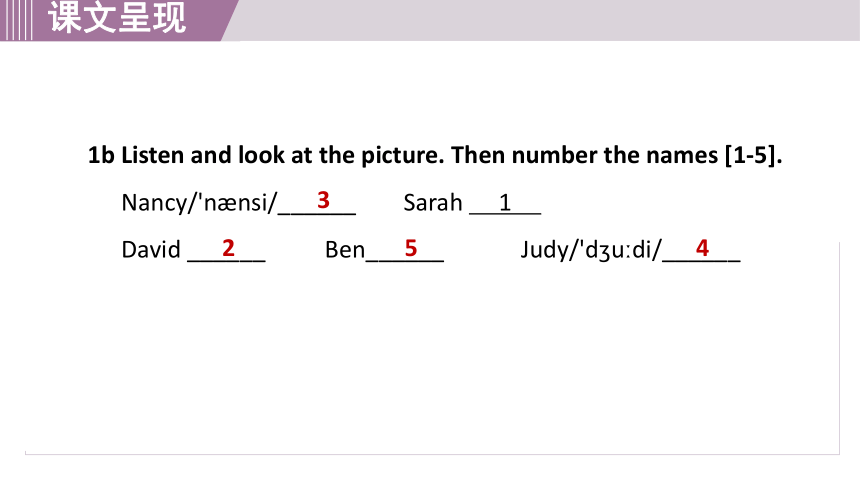
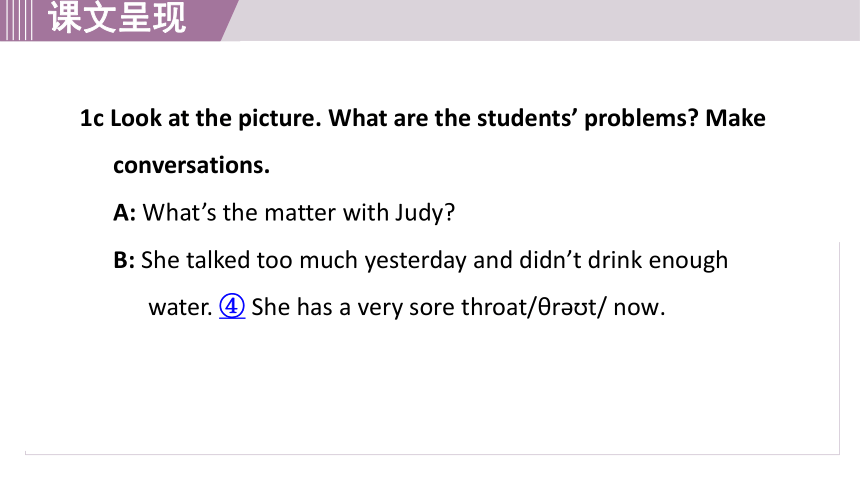
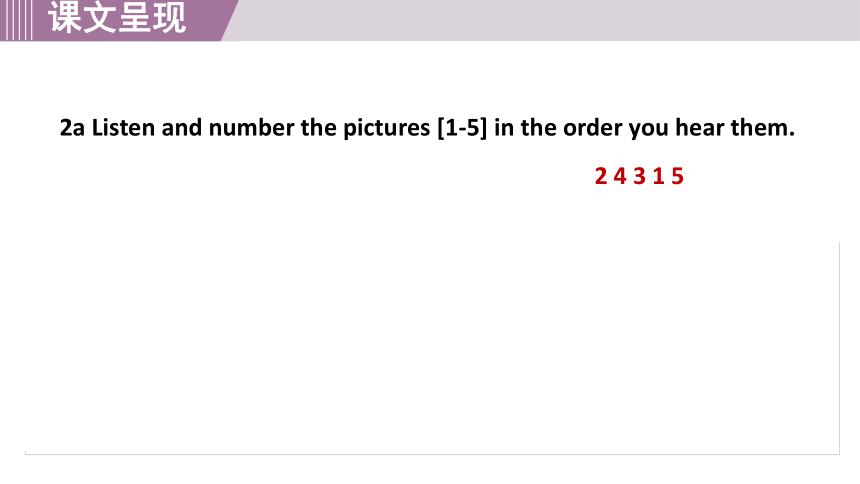

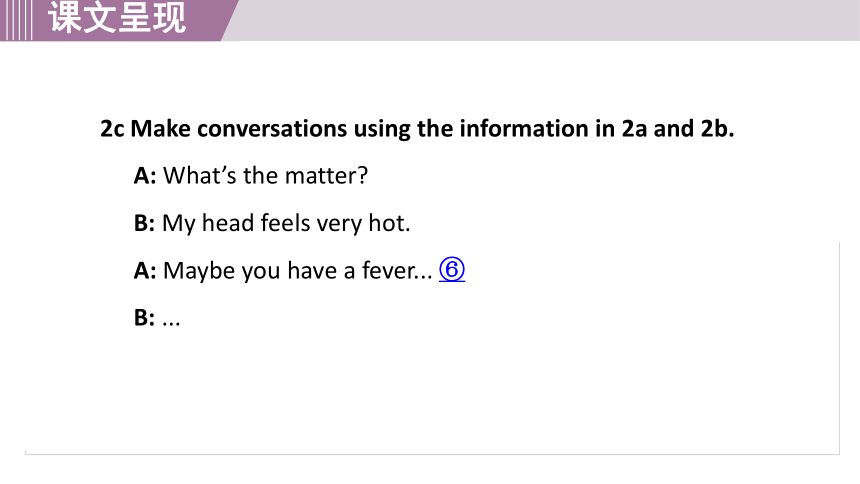
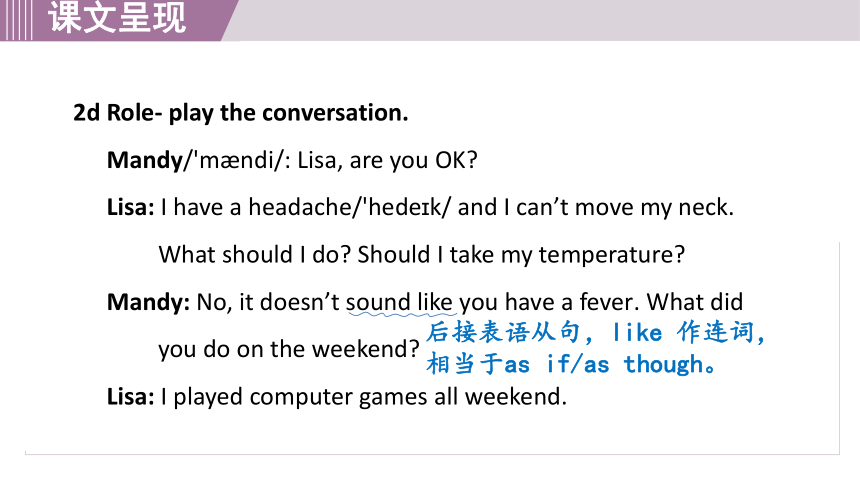
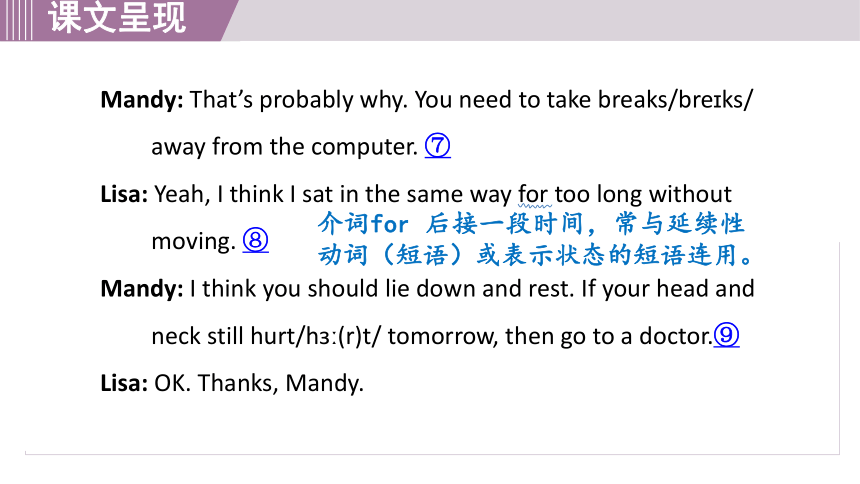

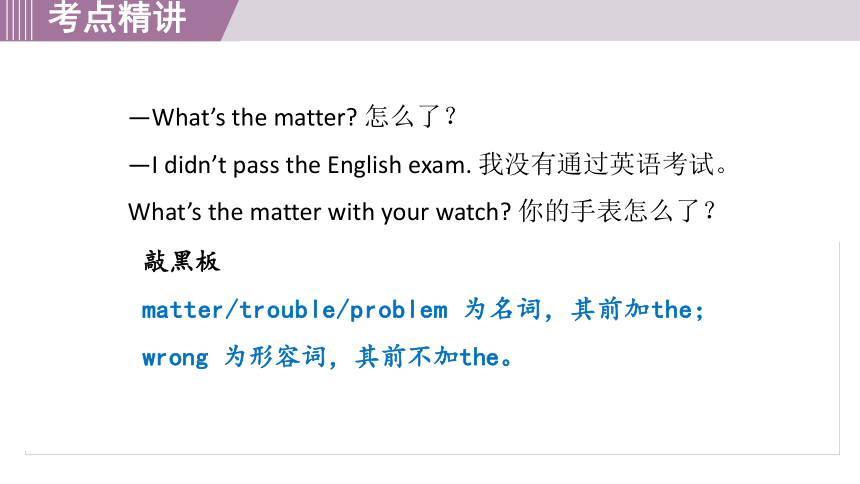
文档简介
(共59张PPT)
Period 1 Section A(1a-2d)
Unit 1 What’s the matter
教材原图
—What’s the matter/‘m t (r)/ ①
—I have a cold.
—What’s the matter
—I have a stomachache/‘st m ke k/. ②
—I have a sore/s (r)/ back.
1a Look at the picture. Write the correct letter [a-m] for each part of the body.
h arm ____ back ____ ear
____eye ____ foot/f t/③ ____ hand
____ head ____ leg ____ mouth
____ neck/nek/ ____ nose
____ stomach/'st m k/ ____ tooth
e
g
i
b
a
j
l
c
d
m
k
f
1b Listen and look at the picture. Then number the names [1-5].
Nancy/'n nsi/______ Sarah 1 .
David ______ Ben______ Judy/'d u di/______
2
3
4
5
1c Look at the picture. What are the students’ problems Make conversations.
A: What’s the matter with Judy
B: She talked too much yesterday and didn’t drink enough water. ④ She has a very sore throat/θr t/ now.
2a Listen and number the pictures [1-5] in the order you hear them.
2 4 3 1 5
2b Listen again. Match the problems with the advice.
1. fever/'fi v (r)/ a. lie/la / down and rest /rest/ ⑤
2. stomachache b. drink some hot tea with honey
3. cough/k f/,/k f/ c. see a dentist and get
and sore throat an X-ray/'eks re /
4. toothache/'tu θe k/ d. take your temperature
5. cut myself e. put some medicine on it
介词短语作定语,放在名词的后面,“with honey”修饰“hot tea”。
发音以元音音素开头,前面使用不定冠词时要用an
take one’s
temperature
量某人的体温
2c Make conversations using the information in 2a and 2b.
A: What’s the matter
B: My head feels very hot.
A: Maybe you have a fever... ⑥
B: ...
2d Role- play the conversation.
Mandy/'m ndi/: Lisa, are you OK
Lisa: I have a headache/'hede k/ and I can’t move my neck. What should I do Should I take my temperature
Mandy: No, it doesn’t sound like you have a fever. What did you do on the weekend
Lisa: I played computer games all weekend.
后接表语从句,like 作连词,
相当于as if/as though。
Mandy: That’s probably why. You need to take breaks/bre ks/ away from the computer. ⑦
Lisa: Yeah, I think I sat in the same way for too long without moving. ⑧
Mandy: I think you should lie down and rest. If your head and neck still hurt/h (r)t/ tomorrow, then go to a doctor.⑨
Lisa: OK. Thanks, Mandy.
介词for 后接一段时间,常与延续性动词(短语)或表示状态的短语连用。
1 What’s the matter
(1) What’s the matter 怎么了?
常用来询问对方的病情。还可以用来询问某人发生了什么不愉快的事情;某物出了什么故障。
—What’s the matter, Dad 怎么了,爸爸?
—I have a toothache. I have to see a dentist.
我牙疼。我必须去看牙医。
—What’s the matter 怎么了?
—I didn’t pass the English exam. 我没有通过英语考试。
What’s the matter with your watch 你的手表怎么了?
敲黑板
matter/trouble/problem 为名词,其前加the;wrong 为形容词,其前不加the。
“你怎么了?”的常见表达::
① What’s the matter/ trouble/problem (with you)
② What’s wrong (with you)
③ What’s up (with you)
④ What happened (to you)
⑤ Is there anything wrong (with you)
考题1: —What’s ______ matter with you, Jerry
—I have a headache.
A. a B. / C. the
C
【点拨】用固定搭配法。What’s the matter with sb. “某人怎么了 ”,固定搭配。
(2) matter /'m t (r)/ n. 问题;事情
As a matter of fact, I didn’t know the truth. 事实上,我不知道真相。
No matter how bad you feel, keep trying.
不管你感觉多么糟糕,继续努力。
拓展: matter 还可以作动词,意为“事关紧要;要紧”。常用于构成句子:It doesn’t matter.(没关系。/无所谓。),用于情景交际中。
It doesn’t matter to me what you do. 你做什么对我来说无所谓。
matter 作名词时的常见搭配:
① What’s the matter (with...) (……)怎么了?
② as a matter of fact 事实上
③ no matter 不重要;不要紧
④ no matter how/what 无论怎样/ 什么
考题2: What’s the ___________(事情)with Bob He looks very down.
matter
返回
温馨提示:可返回原文
2 I have a stomachache.
(1) have /h v/ v. 患病
“have+a/an+表示疾病的名词”表示患某种疾病或某个身体部位不适。have 也可替换为get 或catch。
Please be careful not to have a cold. 请小心不要感冒了。
I have a headache and a cough. And I don’t feel like eating.我头痛而且咳嗽。我不想吃东西。
Have you got a fever 你发烧了吗?
敲黑板“have + a/an+表示疾病的名词”一般不用于进行时态。
(2) stomachache /'st m ke k/ n. 胃痛;腹痛
stomachache 由“stomach(胃)+ ache(疼痛)”构成。
Don’t let him eat too much. He has a stomachache!
不要让他吃太多。他肚子疼!
I have a fever and I have a little headache.
我发烧了,有点头疼。
I couldn’t sleep well with my toothache. 我牙疼得无法入睡。
常见的由have 构成的表示身体部位不适的短语有:
have a headache 头疼
have a cold 感冒
have a toothache 牙疼
have a fever 发烧
have a sore throat 喉咙痛
have a cough 咳嗽
构词法记单词
“表示身体部位的名词+-ache”常用来表示“……痛”,
类似的表达有:
tooth + ache =toothache(牙痛)
head + ache =headache(头痛)
back + ache =backache (背痛)
考题3: I ate too much and had a _____________ (胃痛) yesterday.
stomachache
返回
3 foot
foot /f t/ n. 脚;足
We walk with our feet. 我们用脚走路。
He goes to school on foot every day.
=He walks to school every day. 他每天步行去上学。
We had a picnic at the foot of a mountain.我们在山脚下野餐了。
The child was covered with mud from head to foot.
这个小孩从头到脚被泥覆盖了。
复数形式为feet。
go to ... on foot
= walk to ...
步行去……
由foot 构成的短语:
① on foot 步行
② at the foot of... 在……的脚下
③ from head to foot 从头到脚
考题4: Spiders are insects with eight _________(foot).
考题5: [重庆A 卷] 他更喜欢走路上学,因为那是好的锻炼(方式)。
He prefers to go to school _________ _________ because it’s
good exercise.
feet
返回
【点拨】用关键词法。eight 后加可数名词复数。
on foot
4 She talked too much yesterday and didn’t drink enough water.
(1)too much 太多
辨析:too much, too many 与much too
too much “太多”。修饰动词时,位于动词之后;修饰不可数名词时,位于名词之前。
too many “太多”。修饰可数名词,位于名词之前。
much too “太”。修饰形容词或副词,位于它们之前。
敲黑板 没有many too 的表达!
Eating too much is bad for your health.
吃得太多对你的健康有害。
After the heavy rain, there was too much water in the river.
大雨过后,河里有太多的水。
一语辨异
There were too many people and too much food at the party. He was much too happy.
在聚会上有那么多的人,那么多的食物,他太高兴了。
考题6: He talked _______ and everyone got bored.
A. too much B. too many
C. much too D. many too
A
(2)(高频)enough / 'n f/ det. & adv. 足够的(地);充足的(地)
① enough 作限定词,一般修饰复数名词或不可数名词。
People have enough food to eat now.
现在人们有足够的食物吃。
There aren’t enough books for everyone
to have one each.
没有足够的书让每个人都有一本。
速记小法
enough 的位置:
修饰名词在其前,
修饰形副在其后。
② enough 作副词时,常用于修饰其他副词或形容词,一般置于被修饰词之后。
Lucy sings well enough. 露西唱得足够好。
He is confident enough to make a speech in front of the public. 他足够自信,可以在公众面前发表演讲。
谚语
One man’s trash is another man’s treasure.
彼之砒霜,吾之蜜糖。
考题7: Amy did very well in her report. She is _______ to pay attention to every detail.
A. enough careful B. careful enough
C. enough careless D. careless enough
B
返回
【点拨】用排除法及句意理解法。enough 修饰形容词或副词时,应后置,可排除A 与C;B 项意为“足够细心”;D 项意为“足够粗心”,根据句意可知答案。
5 lie down and rest
(1) lie /la / v. 躺;平躺
辨析:lie 与lay
原形 过去式 过去分词 现在分词
lie vi. 躺;位于 lay lain lying
vi. 说谎 lied lying lay
lay vt. 放置;下蛋 laid laid laying
He lay down and had a rest. 他躺下休息。
There is a book lying on the ground. 地上有一本书。
China lies in the east of Asia.中国位于亚洲东部。
Please tell me the truth. Don’t lie to me again.
请告诉我真相。不要再对我说谎了。
The hen lays an egg every day. 这只母鸡每天下一个蛋。
拓展:lie 还可以作名词,意为“谎言”。tell a lie /lies 意为“说谎”。
He often tells lies and nobody trusts him.他经常说谎,没有人相信他。
躺下
图解助记
速记小法
规则是说谎(lie-lied-lied),
不规则是躺(lie-lay-lain)。
躺过就下蛋(lay-laid-laid),
下蛋不规则。
考题8: After working all day, he couldn’t wait to _________ /la / down on the sofa at home.
考题9: Dazhou _________(lie)in China’s southwest area and has a long history of more than 1, 900 years.
lie
lies
(2) rest /rest/ v. & n. 放松;休息
① rest 作动词时,既可作及物动词,也可作不及物动词。
Rest your eyes every two hours.
每两个小时让你的眼睛休息一下。
He was tired and stopped to rest.
他累了,然后停下来去休息了。
vt.
vi.
② rest 还可以作名词,have/ take a rest 意为“休息”。
I’ll have a deep rest and make myself comfortable.
我要好好休息一下,让自己舒服点。
Let’s have a look at the TV guide and see what’s on.
咱们看看电视节目单,看看有什么节目。
拓展:rest 作名词时还可意为“剩余部分”。
We’ll eat some of the bread and keep the rest for lunch.
我们将吃一些面包,剩下的留到午饭吃。
The rest of the apples are for you. 剩余的苹果是给你的。
the rest of... 剩余的……
由have a +名词”构成的短语还有:
have a break 休息一下
have a swim 游泳
have a walk 散步
have a look 看一看
have a try 试一试
have a talk 谈一谈
考题10: 他太累了,不得不十分钟休息一次。
He was too tired and had to __________ _______ _______ every ten minutes.
have/take a rest
返回
【点拨】have / take a rest “休息”;have to 后接动词原形。
6 Maybe you have a fever...
maybe /'me bi/ adv. 也许;可能
辨析:maybe 与may be
maybe 作副词,意为“也许;可能”,常位于句首作状语。相当于perhaps。
may be 为“情态动词+ be”结构,在句中作谓语,意为“也许;可能”,放在主语之后。后接名词、代词或形容词等。
口诀助记
maybe 与may be:
合并作状语,
分开作谓语。
舍maybe 仍有意,
丢may be 可不成。
Maybe you left it at home. 也许你把它落在家里了。
I can’t find my watch. It may be in your bag.
我找不到我的手表。它可能在你的包里。
Maybe the girl is a teacher. = The girl may be a teacher.
也许这个女孩是一名老师。
敲黑板
maybe 和may be可以进行句型转换,但要做些改变。
考题11: Let’s ask Mr. Green. _______ he knows the answer.
A. Maybe B. May be
C. So D. However
A
返回
7 You need to take breaks away from the computer.
break /bre k/ n. 间歇;休息
I thought a 15-minute break from his work would be good for him.
我认为他停下工作休息15 分钟对他会有好处。
It’s time for us to take breaks. 到我们休息的时间了。
take breaks/take a break,意为“休息”。
拓展:break 还可以作动词,意为“(使)破、裂、碎;打破(纪录);违反”。其过去式为broke。
I broke eggs and put a cold piece of butter into a bowl.
我打破鸡蛋,然后把一块冷黄油放进碗里。
The movie broke all box-office records.
这部影片打破了所有的票房记录。
Don’t break the traffic rules. We must wait.
不要违反交通规则。我们必须等。
谚语记单词
One arrow is easy to break, but ten arrows are hard to break. 一箭易断,十箭难折。
考题12: 医生建议我们久坐之后要稍事休息。
Doctors advise us to ________ ________ after sitting for a long time.
take breaks
返回
8 Yeah, I think I sat in the same way for too long without moving.
(高频)without /w ' a t/ prep. 无;没有
without 后接名词、代词或动名词。其反义词为with。
Fish can’t live without water. 鱼没有水不能活。
This is my new bike. I can’t go to school without it.
这是我的新自行车。没有它,我不能去上学。
It’s wrong that he left his home without telling his parents.
他没有告诉父母就离开了家是不对的。
She came back with a book in her hand.
她回来了,手里拿着一本书。
谚语记单词
A friend without faults will never be found.
没有十全十美的朋友。
谚语
Learn from past mistakes and become wiser.
吃一堑,长一智。
考题13: —Maria. You have made such a great progress in English.
—Thanks, Ms. Chen. I can’t make it ______ your help.
A. with B. without C. for
B
返回
【点拨】用词义辨析法。with 有,具有;without 没有;for 为了。根据“I can’t make it ... your help.”可知,此处指没有对方的帮助,自己的英语不能取得很大进步。
9 If your head and neck still hurt tomorrow, then go to a doctor.
(1)(高频)if / f/ conj. 如果
if 作“如果”讲时,引导条件状语从句,主句常用一般将来时,从句用一般现在时。
I will come to help you if I finish my homework tomorrow.
如果明天我完成了我的作业,我将来帮助你。
拓展:if 还有“是否”之意,引导宾语从句。
He asks me if I will come here tomorrow.
他问我明天我是否会来这里。
一语辨异:
I don’t know if (是否) he will come to your party. If he comes, I will call you. 我不知道他是否会来参加你的聚会。如果他来,我将给你打电话。
考题14: He _______ much healthier if he _______ enough exercise in his free time.
A. is; take B. will be; takes C. will be; take
B
【点拨】用语法判定法。if 引导的条件状语从句,遵循“主将从现”原则,主句用一般将来时,从句用一般现在时。从句主语是he,动词用三单。
(2) hurt /h (r)t/ v.(使)疼痛;受伤(hurt—hurt—hurt)
hurt 作“感到疼痛”讲时,是不及物动词,其主语常常是身体部位;作“(使)疼痛;受伤”讲时,常作及物动词,其宾语常常是身体部位或人。
hurt oneself“伤着某人自己”。
Her head often hurts. 她经常头疼。
My friend fell off the bike and hurt his legs.
我的朋友从自行车上掉下来,伤了腿。
The old man fell down and hurt himself.
那位老人跌倒了,伤着了他自己。
敲黑板
hurt 作“受伤”讲时,可以指肉体上的伤,也可以指精神上的伤。
考题15: His foot h badly yesterday and he had to see a doctor.
urt
返回
Period 1 Section A(1a-2d)
Unit 1 What’s the matter
教材原图
—What’s the matter/‘m t (r)/ ①
—I have a cold.
—What’s the matter
—I have a stomachache/‘st m ke k/. ②
—I have a sore/s (r)/ back.
1a Look at the picture. Write the correct letter [a-m] for each part of the body.
h arm ____ back ____ ear
____eye ____ foot/f t/③ ____ hand
____ head ____ leg ____ mouth
____ neck/nek/ ____ nose
____ stomach/'st m k/ ____ tooth
e
g
i
b
a
j
l
c
d
m
k
f
1b Listen and look at the picture. Then number the names [1-5].
Nancy/'n nsi/______ Sarah 1 .
David ______ Ben______ Judy/'d u di/______
2
3
4
5
1c Look at the picture. What are the students’ problems Make conversations.
A: What’s the matter with Judy
B: She talked too much yesterday and didn’t drink enough water. ④ She has a very sore throat/θr t/ now.
2a Listen and number the pictures [1-5] in the order you hear them.
2 4 3 1 5
2b Listen again. Match the problems with the advice.
1. fever/'fi v (r)/ a. lie/la / down and rest /rest/ ⑤
2. stomachache b. drink some hot tea with honey
3. cough/k f/,/k f/ c. see a dentist and get
and sore throat an X-ray/'eks re /
4. toothache/'tu θe k/ d. take your temperature
5. cut myself e. put some medicine on it
介词短语作定语,放在名词的后面,“with honey”修饰“hot tea”。
发音以元音音素开头,前面使用不定冠词时要用an
take one’s
temperature
量某人的体温
2c Make conversations using the information in 2a and 2b.
A: What’s the matter
B: My head feels very hot.
A: Maybe you have a fever... ⑥
B: ...
2d Role- play the conversation.
Mandy/'m ndi/: Lisa, are you OK
Lisa: I have a headache/'hede k/ and I can’t move my neck. What should I do Should I take my temperature
Mandy: No, it doesn’t sound like you have a fever. What did you do on the weekend
Lisa: I played computer games all weekend.
后接表语从句,like 作连词,
相当于as if/as though。
Mandy: That’s probably why. You need to take breaks/bre ks/ away from the computer. ⑦
Lisa: Yeah, I think I sat in the same way for too long without moving. ⑧
Mandy: I think you should lie down and rest. If your head and neck still hurt/h (r)t/ tomorrow, then go to a doctor.⑨
Lisa: OK. Thanks, Mandy.
介词for 后接一段时间,常与延续性动词(短语)或表示状态的短语连用。
1 What’s the matter
(1) What’s the matter 怎么了?
常用来询问对方的病情。还可以用来询问某人发生了什么不愉快的事情;某物出了什么故障。
—What’s the matter, Dad 怎么了,爸爸?
—I have a toothache. I have to see a dentist.
我牙疼。我必须去看牙医。
—What’s the matter 怎么了?
—I didn’t pass the English exam. 我没有通过英语考试。
What’s the matter with your watch 你的手表怎么了?
敲黑板
matter/trouble/problem 为名词,其前加the;wrong 为形容词,其前不加the。
“你怎么了?”的常见表达::
① What’s the matter/ trouble/problem (with you)
② What’s wrong (with you)
③ What’s up (with you)
④ What happened (to you)
⑤ Is there anything wrong (with you)
考题1: —What’s ______ matter with you, Jerry
—I have a headache.
A. a B. / C. the
C
【点拨】用固定搭配法。What’s the matter with sb. “某人怎么了 ”,固定搭配。
(2) matter /'m t (r)/ n. 问题;事情
As a matter of fact, I didn’t know the truth. 事实上,我不知道真相。
No matter how bad you feel, keep trying.
不管你感觉多么糟糕,继续努力。
拓展: matter 还可以作动词,意为“事关紧要;要紧”。常用于构成句子:It doesn’t matter.(没关系。/无所谓。),用于情景交际中。
It doesn’t matter to me what you do. 你做什么对我来说无所谓。
matter 作名词时的常见搭配:
① What’s the matter (with...) (……)怎么了?
② as a matter of fact 事实上
③ no matter 不重要;不要紧
④ no matter how/what 无论怎样/ 什么
考题2: What’s the ___________(事情)with Bob He looks very down.
matter
返回
温馨提示:可返回原文
2 I have a stomachache.
(1) have /h v/ v. 患病
“have+a/an+表示疾病的名词”表示患某种疾病或某个身体部位不适。have 也可替换为get 或catch。
Please be careful not to have a cold. 请小心不要感冒了。
I have a headache and a cough. And I don’t feel like eating.我头痛而且咳嗽。我不想吃东西。
Have you got a fever 你发烧了吗?
敲黑板“have + a/an+表示疾病的名词”一般不用于进行时态。
(2) stomachache /'st m ke k/ n. 胃痛;腹痛
stomachache 由“stomach(胃)+ ache(疼痛)”构成。
Don’t let him eat too much. He has a stomachache!
不要让他吃太多。他肚子疼!
I have a fever and I have a little headache.
我发烧了,有点头疼。
I couldn’t sleep well with my toothache. 我牙疼得无法入睡。
常见的由have 构成的表示身体部位不适的短语有:
have a headache 头疼
have a cold 感冒
have a toothache 牙疼
have a fever 发烧
have a sore throat 喉咙痛
have a cough 咳嗽
构词法记单词
“表示身体部位的名词+-ache”常用来表示“……痛”,
类似的表达有:
tooth + ache =toothache(牙痛)
head + ache =headache(头痛)
back + ache =backache (背痛)
考题3: I ate too much and had a _____________ (胃痛) yesterday.
stomachache
返回
3 foot
foot /f t/ n. 脚;足
We walk with our feet. 我们用脚走路。
He goes to school on foot every day.
=He walks to school every day. 他每天步行去上学。
We had a picnic at the foot of a mountain.我们在山脚下野餐了。
The child was covered with mud from head to foot.
这个小孩从头到脚被泥覆盖了。
复数形式为feet。
go to ... on foot
= walk to ...
步行去……
由foot 构成的短语:
① on foot 步行
② at the foot of... 在……的脚下
③ from head to foot 从头到脚
考题4: Spiders are insects with eight _________(foot).
考题5: [重庆A 卷] 他更喜欢走路上学,因为那是好的锻炼(方式)。
He prefers to go to school _________ _________ because it’s
good exercise.
feet
返回
【点拨】用关键词法。eight 后加可数名词复数。
on foot
4 She talked too much yesterday and didn’t drink enough water.
(1)too much 太多
辨析:too much, too many 与much too
too much “太多”。修饰动词时,位于动词之后;修饰不可数名词时,位于名词之前。
too many “太多”。修饰可数名词,位于名词之前。
much too “太”。修饰形容词或副词,位于它们之前。
敲黑板 没有many too 的表达!
Eating too much is bad for your health.
吃得太多对你的健康有害。
After the heavy rain, there was too much water in the river.
大雨过后,河里有太多的水。
一语辨异
There were too many people and too much food at the party. He was much too happy.
在聚会上有那么多的人,那么多的食物,他太高兴了。
考题6: He talked _______ and everyone got bored.
A. too much B. too many
C. much too D. many too
A
(2)(高频)enough / 'n f/ det. & adv. 足够的(地);充足的(地)
① enough 作限定词,一般修饰复数名词或不可数名词。
People have enough food to eat now.
现在人们有足够的食物吃。
There aren’t enough books for everyone
to have one each.
没有足够的书让每个人都有一本。
速记小法
enough 的位置:
修饰名词在其前,
修饰形副在其后。
② enough 作副词时,常用于修饰其他副词或形容词,一般置于被修饰词之后。
Lucy sings well enough. 露西唱得足够好。
He is confident enough to make a speech in front of the public. 他足够自信,可以在公众面前发表演讲。
谚语
One man’s trash is another man’s treasure.
彼之砒霜,吾之蜜糖。
考题7: Amy did very well in her report. She is _______ to pay attention to every detail.
A. enough careful B. careful enough
C. enough careless D. careless enough
B
返回
【点拨】用排除法及句意理解法。enough 修饰形容词或副词时,应后置,可排除A 与C;B 项意为“足够细心”;D 项意为“足够粗心”,根据句意可知答案。
5 lie down and rest
(1) lie /la / v. 躺;平躺
辨析:lie 与lay
原形 过去式 过去分词 现在分词
lie vi. 躺;位于 lay lain lying
vi. 说谎 lied lying lay
lay vt. 放置;下蛋 laid laid laying
He lay down and had a rest. 他躺下休息。
There is a book lying on the ground. 地上有一本书。
China lies in the east of Asia.中国位于亚洲东部。
Please tell me the truth. Don’t lie to me again.
请告诉我真相。不要再对我说谎了。
The hen lays an egg every day. 这只母鸡每天下一个蛋。
拓展:lie 还可以作名词,意为“谎言”。tell a lie /lies 意为“说谎”。
He often tells lies and nobody trusts him.他经常说谎,没有人相信他。
躺下
图解助记
速记小法
规则是说谎(lie-lied-lied),
不规则是躺(lie-lay-lain)。
躺过就下蛋(lay-laid-laid),
下蛋不规则。
考题8: After working all day, he couldn’t wait to _________ /la / down on the sofa at home.
考题9: Dazhou _________(lie)in China’s southwest area and has a long history of more than 1, 900 years.
lie
lies
(2) rest /rest/ v. & n. 放松;休息
① rest 作动词时,既可作及物动词,也可作不及物动词。
Rest your eyes every two hours.
每两个小时让你的眼睛休息一下。
He was tired and stopped to rest.
他累了,然后停下来去休息了。
vt.
vi.
② rest 还可以作名词,have/ take a rest 意为“休息”。
I’ll have a deep rest and make myself comfortable.
我要好好休息一下,让自己舒服点。
Let’s have a look at the TV guide and see what’s on.
咱们看看电视节目单,看看有什么节目。
拓展:rest 作名词时还可意为“剩余部分”。
We’ll eat some of the bread and keep the rest for lunch.
我们将吃一些面包,剩下的留到午饭吃。
The rest of the apples are for you. 剩余的苹果是给你的。
the rest of... 剩余的……
由have a +名词”构成的短语还有:
have a break 休息一下
have a swim 游泳
have a walk 散步
have a look 看一看
have a try 试一试
have a talk 谈一谈
考题10: 他太累了,不得不十分钟休息一次。
He was too tired and had to __________ _______ _______ every ten minutes.
have/take a rest
返回
【点拨】have / take a rest “休息”;have to 后接动词原形。
6 Maybe you have a fever...
maybe /'me bi/ adv. 也许;可能
辨析:maybe 与may be
maybe 作副词,意为“也许;可能”,常位于句首作状语。相当于perhaps。
may be 为“情态动词+ be”结构,在句中作谓语,意为“也许;可能”,放在主语之后。后接名词、代词或形容词等。
口诀助记
maybe 与may be:
合并作状语,
分开作谓语。
舍maybe 仍有意,
丢may be 可不成。
Maybe you left it at home. 也许你把它落在家里了。
I can’t find my watch. It may be in your bag.
我找不到我的手表。它可能在你的包里。
Maybe the girl is a teacher. = The girl may be a teacher.
也许这个女孩是一名老师。
敲黑板
maybe 和may be可以进行句型转换,但要做些改变。
考题11: Let’s ask Mr. Green. _______ he knows the answer.
A. Maybe B. May be
C. So D. However
A
返回
7 You need to take breaks away from the computer.
break /bre k/ n. 间歇;休息
I thought a 15-minute break from his work would be good for him.
我认为他停下工作休息15 分钟对他会有好处。
It’s time for us to take breaks. 到我们休息的时间了。
take breaks/take a break,意为“休息”。
拓展:break 还可以作动词,意为“(使)破、裂、碎;打破(纪录);违反”。其过去式为broke。
I broke eggs and put a cold piece of butter into a bowl.
我打破鸡蛋,然后把一块冷黄油放进碗里。
The movie broke all box-office records.
这部影片打破了所有的票房记录。
Don’t break the traffic rules. We must wait.
不要违反交通规则。我们必须等。
谚语记单词
One arrow is easy to break, but ten arrows are hard to break. 一箭易断,十箭难折。
考题12: 医生建议我们久坐之后要稍事休息。
Doctors advise us to ________ ________ after sitting for a long time.
take breaks
返回
8 Yeah, I think I sat in the same way for too long without moving.
(高频)without /w ' a t/ prep. 无;没有
without 后接名词、代词或动名词。其反义词为with。
Fish can’t live without water. 鱼没有水不能活。
This is my new bike. I can’t go to school without it.
这是我的新自行车。没有它,我不能去上学。
It’s wrong that he left his home without telling his parents.
他没有告诉父母就离开了家是不对的。
She came back with a book in her hand.
她回来了,手里拿着一本书。
谚语记单词
A friend without faults will never be found.
没有十全十美的朋友。
谚语
Learn from past mistakes and become wiser.
吃一堑,长一智。
考题13: —Maria. You have made such a great progress in English.
—Thanks, Ms. Chen. I can’t make it ______ your help.
A. with B. without C. for
B
返回
【点拨】用词义辨析法。with 有,具有;without 没有;for 为了。根据“I can’t make it ... your help.”可知,此处指没有对方的帮助,自己的英语不能取得很大进步。
9 If your head and neck still hurt tomorrow, then go to a doctor.
(1)(高频)if / f/ conj. 如果
if 作“如果”讲时,引导条件状语从句,主句常用一般将来时,从句用一般现在时。
I will come to help you if I finish my homework tomorrow.
如果明天我完成了我的作业,我将来帮助你。
拓展:if 还有“是否”之意,引导宾语从句。
He asks me if I will come here tomorrow.
他问我明天我是否会来这里。
一语辨异:
I don’t know if (是否) he will come to your party. If he comes, I will call you. 我不知道他是否会来参加你的聚会。如果他来,我将给你打电话。
考题14: He _______ much healthier if he _______ enough exercise in his free time.
A. is; take B. will be; takes C. will be; take
B
【点拨】用语法判定法。if 引导的条件状语从句,遵循“主将从现”原则,主句用一般将来时,从句用一般现在时。从句主语是he,动词用三单。
(2) hurt /h (r)t/ v.(使)疼痛;受伤(hurt—hurt—hurt)
hurt 作“感到疼痛”讲时,是不及物动词,其主语常常是身体部位;作“(使)疼痛;受伤”讲时,常作及物动词,其宾语常常是身体部位或人。
hurt oneself“伤着某人自己”。
Her head often hurts. 她经常头疼。
My friend fell off the bike and hurt his legs.
我的朋友从自行车上掉下来,伤了腿。
The old man fell down and hurt himself.
那位老人跌倒了,伤着了他自己。
敲黑板
hurt 作“受伤”讲时,可以指肉体上的伤,也可以指精神上的伤。
考题15: His foot h badly yesterday and he had to see a doctor.
urt
返回
同课章节目录
- Unit 1 What's the matter?
- Section A
- Section B
- Unit 2 I'll help to clean up the city parks.
- Section A
- Section B
- Unit 3 Could you please clean your room?
- Section A
- Section B
- Unit 4 Why don't you talk to your parents?
- Section A
- Section B
- Unit 5 What were you doing when the rainstorm came
- Section A
- Section B
- Review of Units 1-5
- Unit 6 An old man tried to move the mountains.
- Section A
- Section B
- Unit 7 What's the highest mountain in the world?
- Section A
- Section B
- Unit 8 Have you read Treasure Island yet?
- Section A
- Section B
- Unit 9 Have you ever been to a museum?
- Section A
- Section B
- Unit 10 I've had this bike for three years.
- Section A
- Section B
